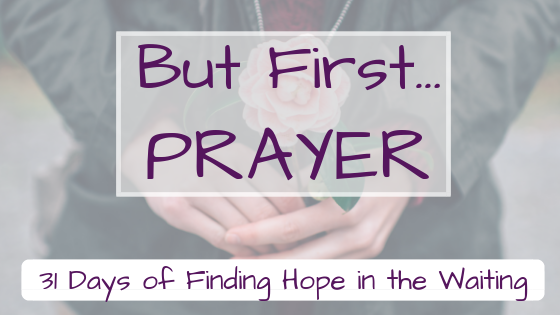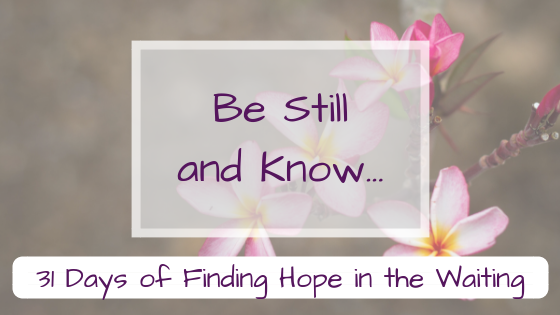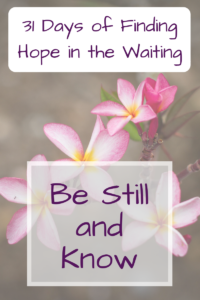
by Sara Collins | Oct 12, 2018 | Finding Hope in the Waiting
With the threat of great trouble looming over them, Jehosophat and all of Israel, small and great, gather before the Lord in fasting and prayer. We looked at that prayer here. They are looking to the Lord in expectation for deliverance. They know God is true to His word; that those who come before Him in humility, with a sacrifice of worship and thanksgiving, will not be forsaken (Psalm 50:14-15). But how will He answer?
God is sovereign and his timing is perfect as He chooses to answer prayer on His own timetable. On this day, He chose to answer right away. He put His Spirit in a Levite of the sons of Asaph who gave the word of God to the people.
Do not fear or be dismayed because of this great multitude, for the battle is not yours but God’s. Tomorrow go down against them…You will not fight in this battle; station yourselves, stand and see the salvation of the Lord on your behalf, O Judah and Jerusalem. Do not fear or be dismayed; tomorrow go out to face them, for the Lord is with you. 2 Chronicles 20:15-17
How amazing is our God! What an answer! It is remnant of our theme psalm for this series, “Be still and know that I am God!” When Jehosophat heard this, he bowed himself in worship and thanksgiving as the Levites stood and praised the Lord in a very loud voice. Our response to the promises of God should always be in worship and thanksgiving.
Today, God does not speak to us through prophets, but through His scriptures, the complete revealed Word of God. When we lift our concerns to God and read the bible we should praise Him for His greatness. Philippians 4:6-7 says, “Be anxious for nothing, but in everything by prayer and supplication with thanksgiving let your requests be made known to God. And the peace of God which surpasses all understanding will guard your hearts and minds in Christ Jesus.”
The Awesome way God Answered
The next day the people of Judah rose early and went to the wilderness to prepare battle lines as God directed. Jehosophat said, “put your trust in the Lord your God and you will be established.” Then he appointed those who sang to the Lord in holy attire. They said, “Give thanks to the Lord for His lovingkindness is everlasting.” The people of Judah showed their faith in God by worshiping before God saved them!
When they began singing and praising, the Lord set ambushes against the sons of Ammon, Moab, and Mount Seir who had come against Judah so they were routed…when Judah came to the lookout…[their enemies] were corpses lying on the ground and no one had escaped.” 2 Chronicles 20:22-24
Because of the ambushes, there was confusion and the three nations whose intention was to war against Judah instead turned against one another. They destroyed each other completely! The Lord saved them that day and they did not even have to lift a finger!
He saved Judah when their hearts were completely submitted to the Lord their God in worship and thanksgiving!
I pray this would be an example to us; that we would humbly bring our concerns before the Lord, with thanksgiving of His blessings. That we would faithfully wait for His salvation. May our hearts say with David, “I waited patiently for the Lord; and He inclined to me and He heard my cry. He brought me up out of the pit of destruction, out of the miry clay, and He set my feet upon a rock making my footsteps firm.”



by Sara Collins | Oct 11, 2018 | Finding Hope in the Waiting
In the last post (here) we saw King Ahaz respond to affliction the wrong way by turning to the world and striving after the wind. The result was devastation. Today I want to show you an example of another king of Judah from 2 Chronicles 20. This king knew his place and knew who ultimately had the power.
King Jehosaphat had learned that the armies of Ammon, Moab, and Mount Seir, a great multitude, were coming out against him and were not far off. He was terrified! Overwhelmed, he may have sat down in dismay. What could he do? How could he possibly face this giant? He knew that he did not have the resources or the ability to do anything to thwart it. He did the only thing he knew to do — pray! Verse 3 tells us his initial reaction, “he turned his attention to seek the Lord and proclaimed a fast throughout all Judah.” He gathered all Judah and they stood before the Lord as a family; the men, their wives, and their children, in humble submission. We can learn so much from his prayer.
“O Lord, the God of our fathers, are You not God in the heavens? And are You not ruler over all the kingdoms of the nations? Power and might are in Your hand so that no one can stand against You. Did You not, O our God, drive out the inhabitants of this land before Your people Israel and give it to the descendants of Abraham Your friend forever? (2 Chron 20:6-7)
O our God, will You not judge them? For we are powerless before this great multitude who are coming against us; nor do we know what to do, but our eyes are on You.” (2 Chron 20:12)
He starts out by acknowledging who God is– Almighty King of the Universe. He knows that God has the ultimate power over all of life’s circumstances and he confesses that truth. When we come before the Lord in desperation, before we state our need, we must acknowledge God’s worthiness. Agree with Moses in Exodus 15:11, “Who is like you, O Lord, among the gods? Who is like you, majestic in holiness, awesome in glorious deeds, doing great wonders?” Pray one of the countless verses in Scripture that tell of God’s greatness. When Jesus modeled prayer for us in Matthew 6:9-13, He also began with praise and acknowledgement.
Jehosophat then reminded God of His promises — that He had promised this land to His people Israel. That He had driven out the Caananites from the land so He could fulfill His covenant with Abraham. We also should pray the promises of the Lord. There is no better prayer than to repeat the words of God and they are a good reminder to us. “Cast your burden upon the Lord and He will sustain you; He will never allow the righteous to be shaken.” Psalm 55:22.
Finally, we see Jehosophat’s humble plea for salvation. Even though he is the King of Judah, even though he has powerful friends, even though he has great armies at his disposal, He knows he is weak. He knows he is nothing before this giant mass that is looming before him. He trusts that the Lord is going to save his nation because of His Great Name. Do you have faith that the God of heaven can handle whatever problem you bring before Him? “Is my hand so short that it cannot ransom? Or have I no power to deliver?” Isaiah 50:2.
The King of Judah humbled himself, bowing with his face to the ground, before the Almighty King of the Universe. James 4:10 says to humble yourself in the sight of the Lord, and He will lift you up. Worshipping the Lord when nothing seems to be going right is humbling: are you willing to let go of your pride and acknowledge God’s sovereignty in your life?
When news of devastation comes to us, where do we turn first for help? To friends, google, or our favorite social media outlet? Our first thought should be of the great God of the Universe. Psalm 121:1-2 says, “I will lift my eyes to the mountains; from where shall my help come? My help comes from the Lord, maker of heaven and earth.”
Come back tomorrow to see the mighty way God answers Jehosophat’s prayer.



by Sara Collins | Oct 9, 2018 | Finding Hope in the Waiting
Yesterday we saw that we are to wait upon the Lord in the midst of trials. Psalm 27 says, Wait for the Lord; be strong and let your heart take courage; yes, wait for the Lord.” In times of despair and suffering we are to bring our requests before Him and know that He is faithful to deliver us. Sometimes I find the best examples of how to follow after God are from the people who did it the wrong way. There is just such a one in 2 Chronicles 28.
Ahaz was a king of Judah who lived during the time of Isaiah. His father and his grandfather both did what was right in the eyes of the Lord. But, for whatever reason, Ahaz did not. He instead followed after the ways of his neighbor, Israel, which meant he served the Baals. He burned incense and sacrificed to them on the high places and under every green tree. He also sacrificed his sons to the false gods, a practice which was reprehensible to God. Because he did this, God gave him over to devastation from other nations. They came in and warred against him, inflicting great casualties and carrying away a great number of captives. His kingdom was in trouble, and, as you can imagine, this was incredible distressing.
What do the psalms of David (which he would have had) say should have been his reaction?
As for me, I shall call upon God, and the Lord will save me.” Psalm 55:16
And
My soul waits in silence for God only; from Him is my salvation. He only is my rock and my salvation, my stronghold; I shall not be greatly shaken.” Psalm 62:1-2
However, Ahaz was not a God-fearing man. He turned to the world for help — namely the King of Assyria. But this was not a good person for Ahaz to place his trust in, for he afflicted Judah rather than strengthening it. King Ahaz, however, was not very bright. He did not make the connection that all this destruction was from God because of his unfaithfulness. He instead said in his heart, “the Assyrian’s gods helped them beat me, so I will sacrifice to them and then they will help me too.”
So Ahaz started running around frantically building altars for the gods of Damascus on every corner of Jerusalem and in every city. He took the utensils out of the Temple and used them in the building of these altars. He even boarded up the Temple so no one could get in. He was desperate, yet for all his running around and trying to do the right thing, nothing was accomplished. His country was not blessed and when he died he was not buried in the court of the kings. His running was in vain — striving after the wind!
Sometimes we do this same thing. We may not be building places of worship to other gods, but we are desperately seeking the world’s solutions to our trials. We are not communing with God (which causes problems already) and we get ourselves into difficult solutions. We feel hopeless and at the end of our rope. We are frenzied and don’t realize that we have turned to the world for answers instead of to the only one who can truly help us.
When circumstances seem hopeless, this Song of David is my prayer and my hope.
I waited patiently for the Lord;
And He inclined to me and heard my cry.
He brought me up out of the pit of destruction, out of the miry clay,
And He set my feet upon a rock making my footsteps firm.
He put a new song in my mouth, a song of praise to our God;
Many will see and fear
And will trust in the Lord.
Psalm 40:1-3
What psalms do you turn to in trials and difficult circumstances?
So, how should we respond instead? Read the following two posts to see that our response should be in prayer and in worship.



by Sara Collins | Oct 8, 2018 | Finding Hope in the Waiting
When I was in times of deep anguish and despair, my mind would start working. I would cease waiting upon the Lord and would begin devising plans to solve the problem. Using human logic, I would race through the many possible ways to get out of the muck and the mire. It was during those times of striving and scrambling, that God would press upon me this deep truth from Psalm 46:10:
Be still and know that I am God
Wait, what?!? Be still! But I have to find a solution!
“No,” God says, “I will bring about a solution. You wait for Me.”
We might be tempted to think that we only have to be still during the small problems, with the large problems requiring immediate action. And while we do need to act quicker on some things, it cannot happen correctly without seeking the Lord first. Read the circumstance described in the verses preceding the command to be still:
God is our refuge and strength,
A very present help in trouble.
Therefore we will not fear, though the earth should change
And though the mountains slip into the heart of the sea;
Though its waters roar and foam,
Though the mountains quake at its swelling pride.
When I read this imagery I think of a disaster movie. One of those where a massive tidal wave or volcanic eruption or earthquake is looming and threatening to kill hundreds of thousands of people as well as destroy miles upon miles of property. The earth may shake and roll; water might envelop people and homes; the landscape will indefinitely change. Panic ensues and people run for their lives; chaos rules the road, not to mention the gas stations and grocery stores. Stillness and peace in the presence of God does not come to mind in this illustration. Yet, the psalmist says that God is our refuge and strength and that we will not fear even if the mountains should slip into the heart of the sea. Wow! That is faith!!
So what does that mean for us? What pitfalls or disasters could happen where God is not our ever present source of strength? There are none! When we rely on our emotions and feelings there are several different circumstances that seem as if they would be unbearable, but in actuality God is our tower of strength through it all — if only we will enter into it.
We should say with Habakkuk:
Though the fig tree should not blossom
And there be no fruit on the vines,
Though the yield of the olive should fail
And the fields produce no food,
Though the flock should be cut off from the fold
And there be no cattle in the stalls,
Yet I will exult in the Lord,
I will rejoice in the God of my salvation.
The Lord God is my strength,
And He has made my feet like hinds’ feet,
And makes me walk on my high places.
Read these posts to see an example of a king of Israel who did not rest in the Lord and also a king who did.




by Sara Collins | Oct 4, 2018 | Finding Hope in the Waiting
When I was deep in the muck and mire of waiting I would often turn to the psalms for comfort and encouragement. So many of them were written from a heart in anguish. When I didn’t have the words to pray, I knew I could pray one of the psalms and it would reveal my heart. Psalm 13 is one of those as it was written during a time of despair, abandonment and loneliness in the life of David. Verses 1-4 say:
How long o lord? Will you forget me forever? How long will you hide your face from me? How long shall I take counsel in my soul,
Having sorrow in my heart all the day?
How long will my enemy be exalted over me?
Consider and answer me, O Lord my God;
Enlighten my eyes, or I will sleep the sleep of death,
And my enemy will say, “I have overcome him,”
And my adversaries will rejoice when I am shaken
While we don’t know the exact circumstance that David wrote this Psalm, I imagine it could have been during the many years that he was on the run, hiding in caves and foreign cities, from Saul who was trying to kill him. Samuel had anointed David king, but it would be several years before he would realize it. How long could very well have been a constant prayer of his. This theme appears throughout the psalms.
David doesn’t wallow in his anguish, however. He turns to what he knows about God. He reads the scriptures. He remembers how God has protected him in the past. In verse 5 his tone changes. Note that his circumstances have not changed, simply his perspective.
But I have trusted in your lovingkindness; my heart shall rejoice in your salvation. I will sing to the Lord because He has dealt bountifully with me.
Just like David, we need to turn to what we know of God. Turn to the scriptures, remind yourselves of the truth of God’s nature. He is never changing. He is the same yesterday today and forever. He was faithful and He will continue to be faithful.
Throughout this series I will be including several of my favorite “go-to” psalms for when I need encouragement.
What are your go to psalms?




















